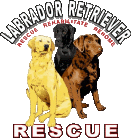LRR’s Philosophy
For many consecutive years, the Labrador Retriever has been the most popular breed of dog in America. Because of this fact, there is an ever increasing (and astonishing) number of homeless and abandoned Labrador Retrievers in our area. Labrador Retrievers are loving loyal dogs who make wonderful family pets. They can also be emotionally and physically ‘high maintenance’ pets, just like many other dog breeds. Many people purchase Labs not realizing their daily need for exercise and human interaction. These Labs may eventually be abandoned at local shelters or surrendered to rescue organizations.
In 1993, LRR was created to fill a need for a purebred Labrador Retriever rescue organization in the Washington, DC metropolitan area. Although there are other rescue organizations in our area, we believe our rescue is unique in the amount of care we provide to our Labs and adopters. Our organizers were involved with other rescue groups in the area before they decided to start LRR. Because of this experience, they were able to use their knowledge and experience with rescue techniques and incorporate them into this organization. In doing so, they developed their own unique philosophies concerning the rescue, rehabilitation and rehoming of Labs.
One unique feature of LRR is that we do not hold public adoption events. We believe that the decision to bring a dog into your life should not be a hasty one and should not be decided at a public event. Dogs become stressed at these events and it is difficult to see the true personality of the dog in these situations. As an organization, we strongly believe that matching our Labs with the perfect owners is of utmost importance, so we take the extra time to thoroughly evaluate both our Labs and potential adopters. We evaluate our Labs both physically and emotionally so that we can provide important information concerning the Lab’s character, both good and bad, to potential adopters.
LRR Labs come to us from animal shelters, SPCAs and other Humane Society Organizations, and in some cases, from owners who can no longer care for their dogs. Many of our Labs are AKC registered, although we do not pass the AKC papers on to new owners.
Our orphans make wonderful pets and adjust well to their new families. We usually have 5 to 10 dogs available for adoption at any one time. Most of our orphans range in age from 1 to 6 years old, and we very rarely have puppies available. We have males and females, in all three Lab colors, with black being the predominant color. Labrador Retrievers are large, active dogs who often exhibit puppy-like behavior until they are three or more years old. For working couples or families with small children, we highly recommend adopting an adult, housebroken dog, since these dogs settle into the family much more easily and quickly than puppies. Be sure to read our Top 10 Reasons to Adopt a Rescued Lab!
We also work with government agencies and other nonprofit service and therapy dog organizations to assist them in finding dogs that would be happier in a service or working dog environment. LRR must feel comfortable with each agency or organization’s training methods and “retirement plans” for the dogs before we will assist them in finding these specialized dogs. We have placed Labs who have become narcotics dogs, arson dogs, underwater cadaver dogs, bomb dogs, forest rangers, assistance dogs and therapy dogs. Our preference is to place our labs in companion homes, but in some cases, our rescue Labs are happier working (or “playing”). It is our goal to place each of our orphans in an environment in which they will flourish and get what they need, be it companionship and a good head scratching, or the challenge of sniffing for drugs or assisting the disabled. We welcome inquiries from area organizations in need of service and working dogs.





